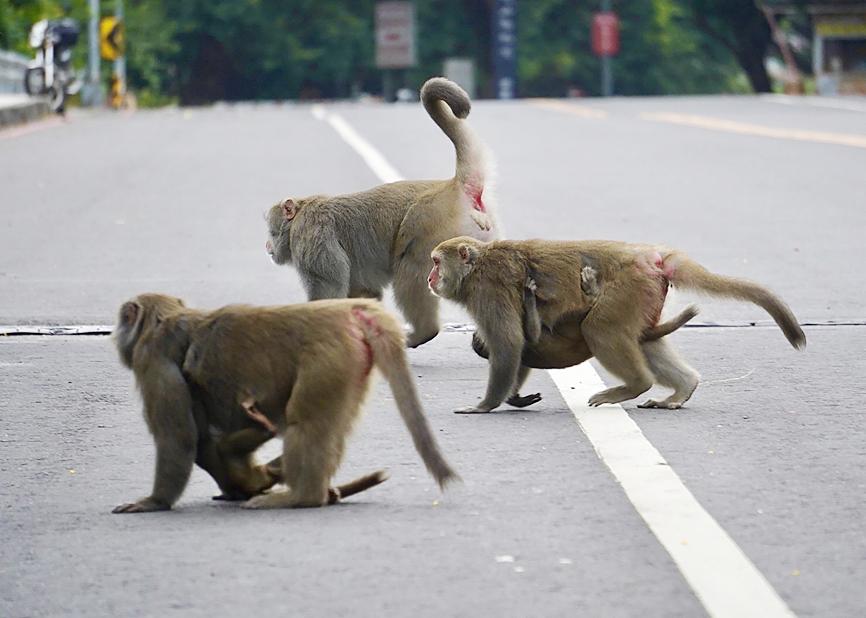Ownership of Formosan rock macaques is to be banned from next month, with owners required to forfeit or register such pets by March, the Council of Agriculture said yesterday.
The macaque would be added to a list of animals prohibited from ownership, importation or exportation, effective on Sept. 1 at the earliest, the council said.
Those who legitimately obtained such animals prior to the rules going into effect would be allowed to microchip and register them with their local agriculture department before March next year, or face a fine of NT$50,000 to NT$250,000 and confiscation of the animal, Department of Animal Industry Deputy Director Chiang Wen-chuan (江文全) said.

Photo: CNA
Macaques are not suitable as pets because they are naturally sociable animals and are prone to transmitting dangerous diseases to humans, Chiang said.
Forestry Bureau data show that there were 12 registered macaques in captivity as of Sept. 1, 2020.
When asked to report how many had been registered as of Monday, municipalities listed seven, three of which were in government care, Chiang said.
However, animal rights advocates believe there are far more macaques being raised illegally than the official numbers suggest.
A study by the Environment and Animal Society of Taiwan found more than 150 reports of macaques being kept in captivity since they were removed from the protected animal list in January 2019.
They were mostly rescues or captured to protect crops, but some baby macaques are also sold as pets for as much as NT$20,000, Environment and Animal Society deputy director Chen Yu-min (陳玉敏) said.
After they were removed from the list, many people thought they were allowed to keep macaques in captivity, Association for Coexistence with Macaca Cyclopis secretary-general Lin Mei-yin (林美吟) said.
Some have been kept in horrible conditions with small cages or forced to interact with visitors, Lin said, adding that she has even heard reports of owners withholding water so the animals would remain small.
Macaque ownership is finally being outlawed after persistent lobbying by animal rights groups, she said, adding that she hopes the new law would make up for years of inaction.
Additional reporting by Yang Yuan-ting

CHANGING LANDSCAPE: Many of the part-time programs for educators were no longer needed, as many teachers obtain a graduate degree before joining the workforce, experts said Taiwanese universities this year canceled 86 programs, Ministry of Education data showed, with educators attributing the closures to the nation’s low birthrate as well as shifting trends. Fifty-three of the shuttered programs were part-time postgraduate degree programs, about 62 percent of the total, the most in the past five years, the data showed. National Taiwan Normal University (NTNU) discontinued the most part-time master’s programs, at 16: chemistry, life science, earth science, physics, fine arts, music, special education, health promotion and health education, educational psychology and counseling, education, design, Chinese as a second language, library and information sciences, mechatronics engineering, history, physical education

The Chinese military has boosted its capability to fight at a high tempo using the element of surprise and new technology, the Ministry of National Defense said in the Quadrennial Defense Review (QDR) published on Monday last week. The ministry highlighted Chinese People’s Liberation Army (PLA) developments showing significant changes in Beijing’s strategy for war on Taiwan. The PLA has made significant headway in building capabilities for all-weather, multi-domain intelligence, surveillance, operational control and a joint air-sea blockade against Taiwan’s lines of communication, it said. The PLA has also improved its capabilities in direct amphibious assault operations aimed at seizing strategically important beaches,

‘MALIGN PURPOSE’: Governments around the world conduct espionage operations, but China’s is different, as its ultimate goal is annexation, a think tank head said Taiwan is facing a growing existential threat from its own people spying for China, experts said, as the government seeks to toughen measures to stop Beijing’s infiltration efforts and deter Taiwanese turncoats. While Beijing and Taipei have been spying on each other for years, experts said that espionage posed a bigger threat to Taiwan due to the risk of a Chinese attack. Taiwan’s intelligence agency said China used “diverse channels and tactics” to infiltrate the nation’s military, government agencies and pro-China organizations. The main targets were retired and active members of the military, persuaded by money, blackmail or pro-China ideology to steal

The High Prosecutors’ Office yesterday withdrew an appeal against the acquittal of a former bank manager 22 years after his death, marking Taiwan’s first instance of prosecutors rendering posthumous justice to a wrongfully convicted defendant. Chu Ching-en (諸慶恩) — formerly a manager at the Taipei branch of BNP Paribas — was in 1999 accused by Weng Mao-chung (翁茂鍾), then-president of Chia Her Industrial Co, of forging a request for a fixed deposit of US$10 million by I-Hwa Industrial Co, a subsidiary of Chia Her, which was used as collateral. Chu was ruled not guilty in the first trial, but was found guilty